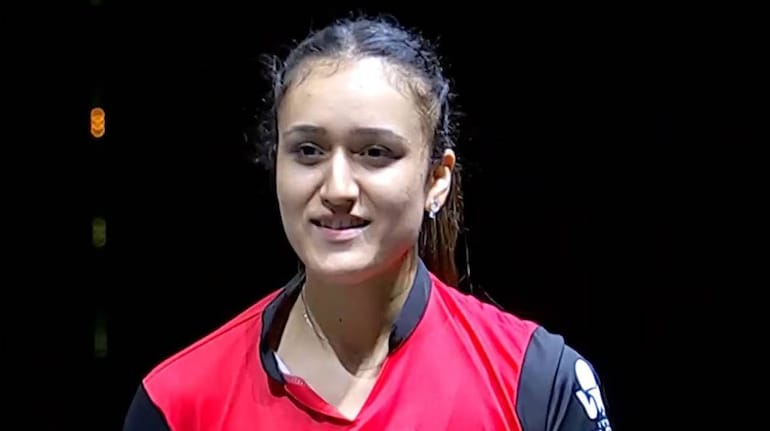India’s No. 1 paddler set aside a number of setbacks to win bronze at the Asian Cup 2022.

How Manika Batra became the first Indian woman to win a medal at Asian Cup Table Tennis
Behind Manika Batra’s fight to clinch Asian Cup Bronze were her mother’s remarks, hard work and good form, meditation, and mixed-doubles partner G Sathiyan’s motivation.
Back in the day when Manika Batra was still finding her feet in the world of table tennis, her mother, Sushma, was a constant presence on the sidelines. That, however, came with its fair share of nerve-wracking moments, which, at times, became unbearable to deal with.
“I would be down a few points and then make a comeback and win the match. On other occasions, I would be in a winning position, only to slip, allow my opponent to catch up, before closing out the game,” Batra recalls.
“Aisa bohot hua hai, aur mummy mujhe keheti thi — tu mujhe heart attack hi de deti hai (There’ve been many occasions when my mother said her heart skipped a beat because of me),” she says.
Last month, Batra found herself in a similar position at the ITTF-ATTU Asian Cup 2022 table tennis championship in Bangkok. She was down 6-10 in the fourth game during the bronze medal match against World No.6 Hina Hayata of Japan. Her mind went back to those moments from the past. She knew she had to dig deep if she wanted to win.
“Hayata still needed a point. And she was also under pressure to win that point. Like in the past, I knew I had to continue fighting and not think of anything else,” Batra says.
She bounced back to win the crucial game 12-10, before sealing the tie 4-2 to become the first Indian woman to win a medal at the tournament. And besides Hayata, the 27-year-old had accounted for two other higher ranked players in Chen Xintong (World No. 7) and Chen Szu-Yu (World No. 23) en route the bronze.
Earlier in the tournament, she had lost to World No. 5, Mima Ito, at the semi-final stage, before setting up the third-placed match against Szu-Yu, who had beaten Batra at the World Table Tennis (WTT) Championships as recently as October this year.
“I feel like keeping calm, while at the same time maintaining that fighting spirit, helped me right through the tournament,” she says.
At the end of her win over Hayata, Batra looked up to the heavens, relieved to have ended her miserable run of form. In March this year, she made the quarterfinal stage of the WTT Contender in Muscat. Two months later in May, she achieved her career-best ranking of World No. 38.
As defending champion in the women’s singles and the women’s team event at the Commonwealth Games, besides bagging another silver (women’s doubles) and a bronze (mixed doubles), a lot was at stake for India’s top female paddler. But by the end of it, she returned empty-handed from Birmingham in August.
“There was a lot of pressure, having done well at the previous edition of the Games. It really affected my performance. I told myself — time will come when you will win, it’s okay to lose sometimes,” she says.
The bad phase continued here on. While she would step out each day to train, Batra assessed her situation closely to understand where she stood.
“I asked myself what was wrong, because it’s only you who can come up with the solution. I told myself that it wasn’t over just yet,” she says.
“I continued working as hard, both on and off the table, when it came to the physical aspect of my sport. But I also took time off to look after my mental health — a lot of meditation and mental exercises. I had to keep putting in the effort, knowing that it may not pay off immediately. And all of it is helping me now,” she adds.
Her partner in the mixed doubles, G Sathiyan, kept her motivated during this low phase. Two weeks before the tournament in Bangkok, Batra and Sathiyan earned their second silver of the year after finishing runners-up at the WTT Contender in Slovenia. The result also helped them break into the top-5 of the world in the mixed doubles — the first Indian pair to do so. It took some pressure off Batra.
“Before the Asian Cup, I decided to simply enjoy the game like I did when I started playing table tennis. It didn’t matter whether I won or lost, who my opponents were and how they were ranked. I just wanted to do the things that I had worked on during training. And keep doing them right,” Batra says.
“This medal means a lot to me, more so because I am only the second Indian to win it,” she says.
A week later, Batra had broken into the top-40 of the world yet again and is currently ranked at World No. 39. The form is back, as is her focus.“Just a day after that medal, I was looking ahead — abhi yeh ho gaya, ab doosra medal chahiye (This one is done, it’s time to target the next medal). My goal is to break into the top-20, then the top-10. But more than that, I want to beat some of the good players on the circuit. And if I can continue working in this way and trust the process, I hope to put on a better show at the 2024 Olympics than I did the last time around. And hopefully win a medal for the country in the singles or the mixed doubles,” she says.